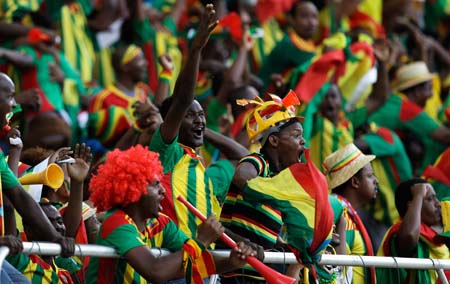
FILE – In this photo taken Monday, Jan. 21 2013, Ethiopian supporters celebrate a goal during a game against Zambia, during their African Cup of Nations tournament in Nelspruit, South Africa. After falling off the football map for thre decades Ethiopia is now just two games away from qualifying for the 2014 World Cup in Brazil. (AP Photo / Armando Franca, file)
JOHANNESBURG (AP) — It once seemed inconceivable. Yet, Ethiopia is just two games from reaching the 2014 World Cup.
This was a country that was the champion of African soccer in 1962. Ethiopia then fell off the soccer map for three decades. Civil war ravaged the country and famine killed nearly a half million people in the early 1980s.
Sports still played a part in the country, notably the magnificent runners hardened by poverty and high altitude. After barefoot Abebe Bikila won marathon gold medals in Rome (1960) and Tokyo (1964), generations of Ethiopian Olympic champions inspired the next. But there were no longer any Ethiopian soccer players of any great renown.
There still aren’t, although that could be about to change.
To become one of five African teams that will travel to the World Cup in Brazil next June, Ethiopia must beat current African champion Nigeria in the qualifying playoffs. The first match is Sunday in Addis Ababa Stadium. The return game is Nov. 16.
Nigeria, Africa’s most populous country, has played in four of the last five World Cups. It can call upon such stars as Chelsea’s John Obi Mikel, Liverpool’s Victor Moses and players from the Italian and Spanish leagues.
Ethiopia has never played in the World Cup. Its appearance at the Africa Cup of Nations this January was its first at a major tournament in 31 years. And few outside Ethiopia will have heard of Saladin Said, its top player.
The striker has made the biggest mark of any player on Ethiopia’s national team by playing for the Belgian club Lierse. A couple of other players play in Libya and Kazakhstan. Ethiopia is the only team that coach Sewnet Bishaw, a schoolteacher, has managed.
If Ethiopia were to qualify for Brazil, it would join a line of African success stories at the World Cup.
In 1990, Cameroon stunned Argentina and made it to the quarterfinals, highlighted by Roger Milla’s iconic hip-wiggling dance at the corner flag. In 2002, Senegal defeated its former colonial power — world champion France. In South Africa three years ago, Ghana provided a gripping story line. The entire continent rallied behind the Black Stars on their march to the knockout round in the first World Cup in Africa.
The passion for soccer in Ethiopia easily matches those of West African nations.
At the African Cup this January, Ethiopia fans unfurled a banner that read: “We’re sorry for our behavior but we love the game.” That was after supporters hurled plastic bottles onto the field, furious at a red card shown to Ethiopia’s goalkeeper for a flying chest-high kick on a Zambia striker.
To reach the last 10 African teams in the World Cup playoffs, Ethiopia came through a qualifying group containing 2010 host South Africa, Central African Republic and Botswana. It also overcame being docked three points for fielding ineligible midfielder Minyahile Beyene while he was suspended.
Sellout crowds in Addis Ababa drive the team. What players lack in technique they make up for with endurance. This, after all, is a country of runners.
In 1980, about the last time Ethiopia qualified for a major soccer tournament, future Olympic running champion Haile Gebrselassie was 7 years old. He took his father’s radio and ran into the fields around his home to listen to commentary from Moscow of Miruts Yifter winning the 10,000-meter gold medal at the Summer Games. That day, Gebrselassie decided that he, too, wanted to be an Olympic champion.
Now, if Ethiopia gets past Nigeria, this team could leave a similar legacy.